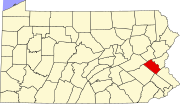Alburtis, Pennsylvania
Alburtis is a borough in Lehigh County, Pennsylvania, in the United States. It is a suburb of Allentown, in the Lehigh Valley region of the state. Alburtis is included in the Allentown-Bethlehem-Easton, PA-NJ Metropolitan Statistical Area, which is also included in the New York City-Newark, New Jersey, NY-NJ-CT-PA Combined Statistical Area.
The population of Alburtis was 2,361 at the 2010 census.
Geography
According to the United States Census Bureau, the borough has a total area of 0.7 square miles (1.8 km2), all of it land. However, the Alburtis zip code (18011) comprises two separate areas stretching from south of Trexlertown well into District township of neighboring Berks County.[1]
History
Local tradition holds that the town was named after Edward K. Alburtis, a civil engineer involved in the construction of the East Pennsylvania Branch of the Philadelphia and Reading Railway. When a railroad station was established in the town, the railroad’s Board of Directors named it in honor of Alburtis in 1859.[2]
The Lock Ridge Furnace Complex and George F. Schlicher Hotel are listed on the National Register of Historic Places.[3]
Demographics
| Census | Pop. | Note | %± |
|---|---|---|---|
| 1880 | 500 | — | |
| 1920 | 795 | — | |
| 1930 | 823 | 3.5% | |
| 1940 | 885 | 7.5% | |
| 1950 | 979 | 10.6% | |
| 1960 | 1,086 | 10.9% | |
| 1970 | 1,142 | 5.2% | |
| 1980 | 1,428 | 25.0% | |
| 1990 | 1,415 | −0.9% | |
| 2000 | 2,117 | 49.6% | |
| 2010 | 2,361 | 11.5% | |
| 2014 (est.) | 2,402 | [4] | 1.7% |
| Sources:[5][6] | |||
As of the census[7] of 2000, there were 2,117 people, 774 households and 593 families residing in the borough. The population density was 2,993.2 per square mile (1,151.2/km²). There were 799 housing units at an average density of 1,129.7 per square mile (434.5/km²). The racial makeup of the borough was 97.21% White, 0.33% African American, 0.05% Native American, 1.42% Asian, 0.24% Pacific Islander, 0.24% from other races, and 0.52% from two or more races. Hispanic or Latino of any race were 0.85% of the population.
There were 774 households, of which 42.6% had children under the age of 18 living with them, 62.5% were married couples living together, 9.2% had a female householder with no husband present, and 23.3% were non-families. 18.9% of all households were made up of individuals, and 5.6% had someone living alone who was 65 years of age or older. The average household size was 2.74 and the average family size was 3.13.
In the borough the population was spread out, with 29.7% of the population under the age of 18, 6.5% from 18 to 24, 38.6% from 25 to 44, 17.9% from 45 to 64, and 7.3% who were 65 years of age or older. The median age was 33 years. For every 100 females there were 99.5 males. For every 100 females age 18 and over, there were 97.7 males.
The median income for a household in the borough was $52,361, and the median income for a family was $57,863. Males had a median income of $36,915 compared with $27,094 for females. The per capita income for the borough was $20,611. About 2.8% of families and 3.4% of the population were below the poverty line, including 3.4% of those under age 18 and 8.8% of those age 65 or over.
Public education
The Borough is served by the East Penn School District. Emmaus High School serves grades nine through 12. Eyer Middle School and Lower Macungie Middle School serve grades six through eight.
Recreation
Lock Ridge Park is the predominant public park in Alburtis. Swabia Creek flows through the park and borough.
References
- ^ "Google Maps". Google.com. Retrieved 2016-02-09.
- ^ "History, Borough of Alburtis". Alburtis.org. Retrieved December 14, 2011.
- ^ "National Register Information System". National Register of Historic Places. National Park Service. July 9, 2010.
- ^ "Annual Estimates of the Resident Population for Incorporated Places: April 1, 2010 to July 1, 2014". Census.gov. Retrieved June 4, 2015.
- ^ "Census of Population and Housing: Decennial Censuses". United States Census Bureau. Retrieved 2012-03-04.
- ^ "Incorporated Places and Minor Civil Divisions Datasets: Subcounty Resident Population Estimates: April 1, 2010 to July 1, 2012". Population Estimates. U.S. Census Bureau. Retrieved 11 December 2013.
- ^ "American FactFinder". United States Census Bureau. Retrieved 2008-01-31.

